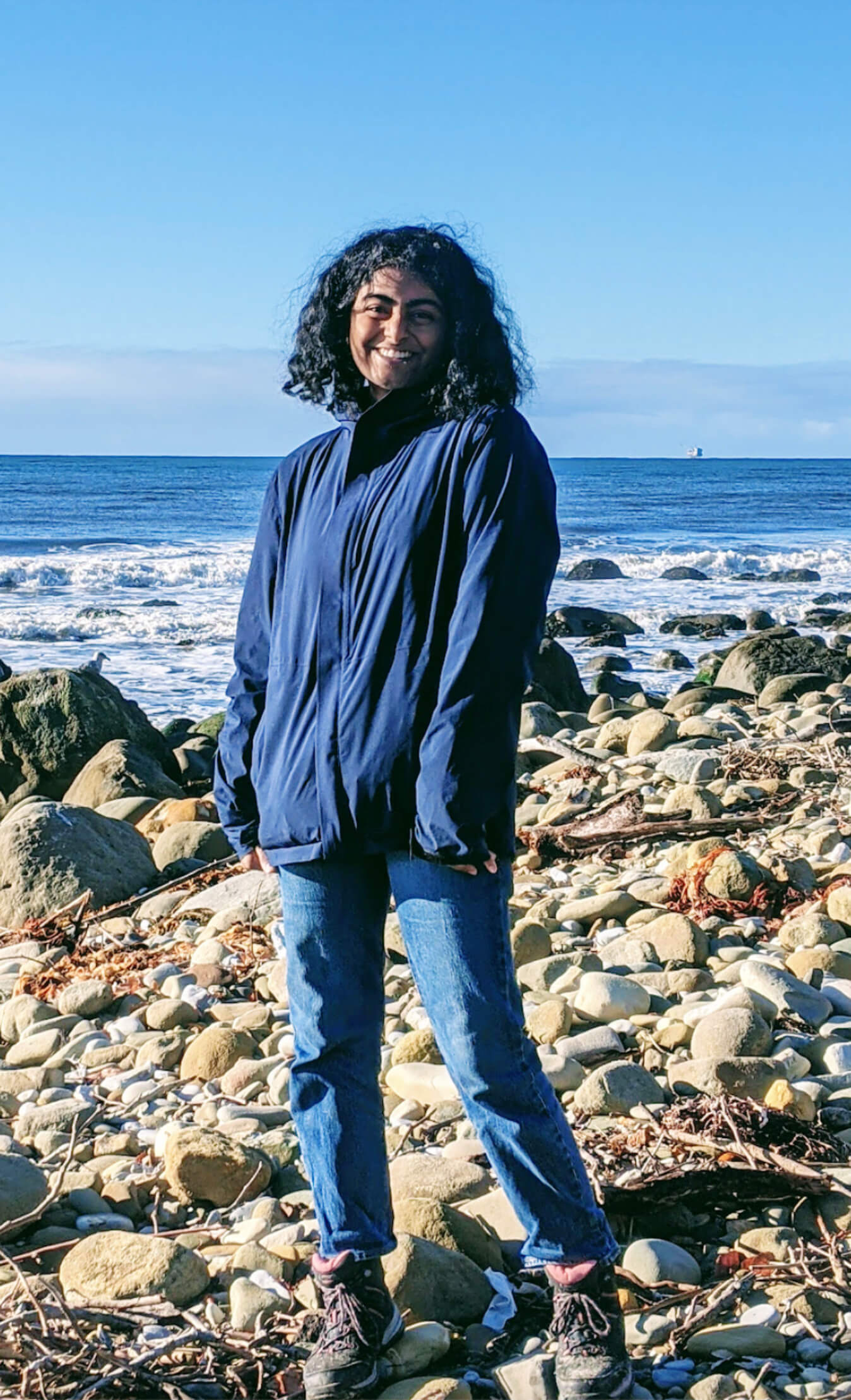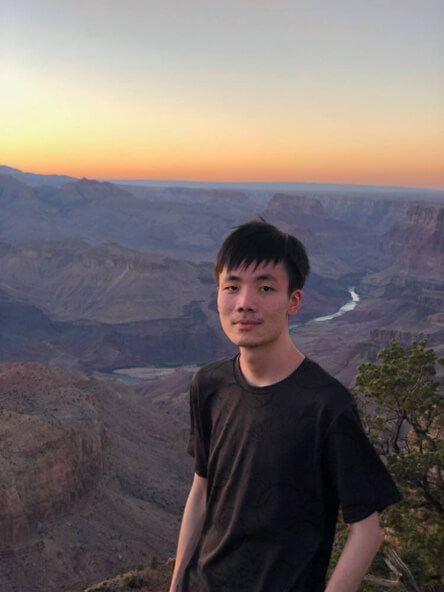Three Purdue CS undergrads earn honorable recognition in CRA Outstanding Undergraduate Researcher Competition
02-09-2022
Simran Kadadi, Shangyin Tan, and Man To Tang pursued research as undergraduates in distinct areas; Kadadi in computational biology, Tan in programming languages, and Tang in graphics and visualization. All brought with them the innovation and creativity that is part of the persistent pursuit to solve complex challenges in any field.
Their efforts earned all three computer science majors an honorable recognition in the 2022 Computing Research Association (CRA) Outstanding Undergraduate Researcher competition. The award recognizes students in North American universities who show outstanding potential in an area of computing research.
Simran Kadadi is a junior in computer science honors and is engaged in both the machine intelligence and algorithmic foundations track. Her interests are in the research area of computational biology, specifically using algorithms to analyze data and drive treatment strategies for viral associated cancers.

“I approached Professor Majid Kazemian with an interest in computational biology research my freshman year,” said Kadadi. She added, “I was interested in pursuing research that would complement my computer science background.”
“My research with the Kazemian Lab has helped me find meaning in my coursework and grow as a computer scientist,” said Kadadi. She added, “There is a positive culture of learning at the Kazemian Lab that inspired me to take a leap with my journey in computational biology, and I am so glad I did.”
Kadadi’s favorite part of her academic undergraduate experience at Purdue CS has been using her computer science background to tackle real-world problems.
“I want to have an effect on real problems that affect real people,” she said. Kadadi added, “I’m learning about the ability to push the boundaries of what we know of the human body and the field of genomics. It helped me take my interest in biology as a freshman and uncover a lifelong passion for exploration and discovery.”
Kadadi has contributed to the work in Professor Kazemian’s lab and their articles are being submitted for review.
Shangyin Tan graduated in December of 2021 with a bachelors in computer science honors in the computational science and engineering track and his research interests are in the field of programming languages, software engineering, and program analysis.

“I became interested in the field of programming language and functional programming after taking Professor Tiark Rompf’s course CS 352 on compilers,” said Tan.
In the course, students built a Scala compiler and Tan was so intrigued with the concepts, he requested to work with Rompf on a symbolic execution compiler project.
“I contributed to the design and implementation of our symbolic execution compiler using multistage programming and algebraic effects,” said Tan. He added, “We redesigned the traditional way to build symbolic execution engines and brought new performance advantages and optimization opportunities.”
The research opportunity connected Tan not only with Professor Rompf, who he worked with for 18 months, but also programming language researchers, Professor Benjamin Delaware, Professor Roopsha Samanta, and Professor Tianyi Zhang, over his last semester. He counts his favorite accomplishment at Purdue has been the research projects with faculty.
“All the faculty members I worked with provided useful advice on undergraduate research and my career. It was wonderful to receive help from well-respected researchers in the field as they were patient, kind, and approachable. Without them, I would not be where I am today,” said Tan.
Tan was an author on two papers during his undergraduate career and first author for a short paper at POPL 2022.
- Guannan Wei, Shangyin Tan, Oliver Bračevac, and Tiark Rompf. 2021. LLSC: a parallel symbolic execution compiler for LLVM IR. Proceedings of the 29th ACM Joint Meeting on European Software Engineering Conference and Symposium on the Foundations of Software Engineering. Association for Computing Machinery, New York, NY, USA, 1495–1499. DOI:https://doi.org/10.1145/3468264.3473108
- Guannan Wei, Oliver Bračevac, Shangyin Tan, and Tiark Rompf. 2020. Compiling symbolic execution with staging and algebraic effects. Proc. ACM Program. Lang. 4, OOPSLA, Article 164 (November 2020), 33 pages. DOI:https://doi.org/10.1145/3428232
- [PEPM 22] Shangyin Tan, Guannan Wei, and Tiark Rompf. Towards partially evaluating symbolic interpreters for all (short paper). https://popl22.sigplan.org/details/pepm-2022-papers/1/Partially-Evaluating-Symbolic-Interpreters-for-All
Man To Tang graduated in December of 2021 with a bachelors in computer science honors in the systems programming & computer graphics track and his research interests are in mixed reality (MR) and human-computer interaction (HCI). He is interested in exploring the potential of avatars across a variety of applications, from virtual reality (VR) concerts to remote collaboration.

Tang became interested in pursuing undergraduate research after taking Professor Voicu Popesco’s VR and graduate graphics course. “Professor Popescu gave me the flexibility to research a MR phenomenon that I was interested in called, “Virtual YouTubers,” or content creators who roleplay a fictional persona by embodying a motion-captured avatar,” said Tang. He added, “I initiated the research and led the development of AlterEcho, a novel VTubing avatar animation system that decouples the avatar from pure motion capture, unleashing the avatar’s expressiveness while reducing mental load on the user.”
“Man To created AlterEcho, a novel approach to VTubing that loosens the coupling between avatar and streamer,” said Popescu. He added, “For his work, Tiger was awarded the Best Student-Led Conference Paper Award at ISMAR 2021.”
“I was fortunate to work with Professor Popescu for all of 2021 and later I joined Professor Tianyi Zhang,” said Tang. He added, “Professor Zhang allowed me to be part of various HCI projects that focus on leveraging the power of ML/AI on assisting programmers to write better code.”
Tang’s favorite accomplishment at Purdue was completing and publishing AlterEcho.
“It perfectly combined what I was interested in and what I learned at Purdue. It was my first time conducting a large-scale user study (n=315) with a software I developed.”
“As a part-time entrepreneur, it felt like launching a new product, except this time to academia. I was delighted our paper was accepted, considering the concept of Virtual YouTubers is so new and subcultural,” said Tang.
T. Tang, V. L. Zhu and V. Popescu, 2021. AlterEcho: Loose Avatar-Streamer Coupling for Expressive VTubing. IEEE International Symposium on Mixed and Augmented Reality (ISMAR), pp. 128-137, doi: 10.1109/ISMAR52148.2021.00027.
About the Department of Computer Science at Purdue University
Founded in 1962, the Department of Computer Science was created to be an innovative base of knowledge in the emerging field of computing as the first degree-awarding program in the United States. The department continues to advance the computer science industry through research. US News & Reports ranks Purdue CS #20 and #18 overall in graduate and undergraduate programs respectively, ninth in both software engineering and cybersecurity, 14th in programming languages, 13th in computing systems, and 24th in artificial intelligence. Graduates of the program are able to solve complex and challenging problems in many fields. Our consistent success in an ever-changing landscape is reflected in the record undergraduate enrollment, increased faculty hiring, innovative research projects, and the creation of new academic programs. The increasing centrality of computer science in academic disciplines and society, and new research activities - centered around data science, artificial intelligence, programming languages, theoretical computer science, machine learning, and cybersecurity - are the future focus of the department. cs.purdue.edu
Writer: Emily Kinsell, emily@purdue.edu
Sources: Simran Kadadi, skadadi@purdue.edu
Shangyin Tan, tan279@purdue.edu
Man To Tang, tang426@purdue.edu